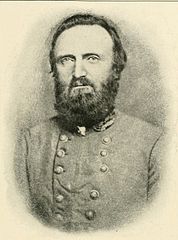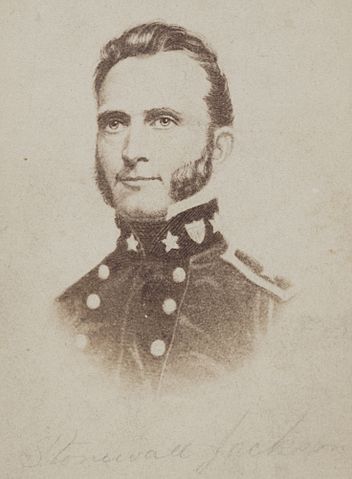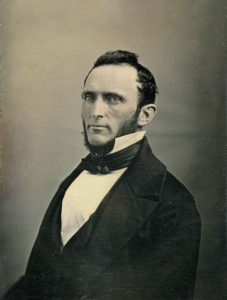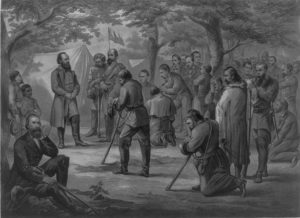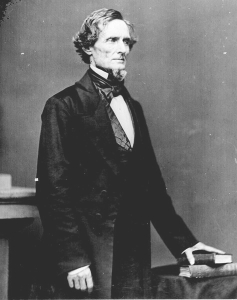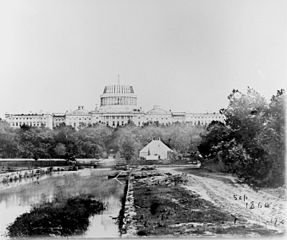The Mystique Of Stonewall Jackson
Thomas Jonathan “Stonewall” Jackson is a fascinating character of the Civil War. His battlefield successes, Robert E. Lee calling him his right-hand man, his nickname of Stonewall, his legendary 1862 Shenandoah Valley campaign, his personal eccentricities, his strong faith in God, and his death from friendly fire, have all made him larger than life and created a mystique about him. Note that Jackson would not gain his nickname of “Stonewall” until the First Battle of Bull Run.
Thomas Jackson’s early life was a sad and difficult one. He was born on January 21, 1824, and when he was two-years-old the month of March 1826, would bring tragedy to his family. On March 6, 1826, his sister Elizabeth died of typhoid fever. On March 26, only the day after mother Julia gave birth to Thomas’ sister Laura Ann, his father Jonathan also died of typhoid fever. Julia Jackson was now a widow at age twenty-eight, deeply in debt, and with a young family to support. She refused to accept charity. To pay off the debt, Julia sold family belongings, moved her family into a small rented house, sewed, and she taught school. Julia married again in 1830 and died the following year giving birth to Thomas Jackson’s half-brother. Her health had been poor for some time prior to her death. Julia’s declining health caused Thomas and his younger sister Laura Ann to leave their home and live with their half-uncle Cummins Jackson at Jackson’s Mill, Virginia (now West Virginia). Cummins Jackson owned a farm and a grist mill at Jackson’s Mill.Young Thomas Jackson worked at his Uncle Cummins farm at Jackson’s Mill. He had a sheepdog to help him herd sheep, he drove teams of oxen, and there were crops such as corn and wheat to be harvested. Jackson’s education was not full. He attended school classes sporadically, it was now and then, but never enough.
Thomas Jackson wanted to make something of himself by attending West Point. It was hard for him to pass West Point’s entrance examinations, but in 1842 he became a cadet at The United States Military Academy. Jackson was not prepared for the difficult West Point academics as his prior education was lacking, especially when compared to other cadets with more fortunate backgrounds. Academically, he was near the bottom of his class. Thomas Jackson was not lacking in determination and he set himself on a course of working and studying very hard to keep up with West Point’s demanding academics. Over his years at West Point Thomas Jackson steadily increased his class standing. He eventually worked his way up to finish with a respectable class ranking of 17th of 59 cadets in the 1846 West Point class.
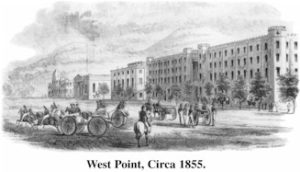
West Point, Circa 1855.
Photo Courtesy West Point Museum Collections, United States Military Academy
***
“Knowing that he had no influential friends to urge his appointment, and that even if he secured it, he was poorly prepared to pass the preliminary examination, I at first discouraged him in his purpose. Seeing that his mind was made up, I did all I could to advance his interests.”
…The words of William E. Arnold. In 1842, Thomas Jackson was hoping to obtain an appointment to West Point after an earlier attempt had failed. Jackson’s fortune would change. A young man who had received an appointment to West Point instead of Jackson had found life at West Point too unsuitable and he returned home. Jackson now had another chance at West Point but he needed to gain support from his community to obtain the appointment. Thomas sought out William E. Arnold, whom he’d known all his life, for his advice and for an endorsement. Despite having reservations about Jackson, Arnold saw that Thomas Jackson was determined to attend West Point and provided him an endorsement.
***
“I know that I shall have the application necessary to succeed. I hope that I have the capacity. At least I am determined to try, and I wish you to help me to do this.”
… Jonathan M. Bennett was an attorney with influence. Thomas Jackson wanted Bennett to write him a letter of introduction to Congressman Hays in Washington, of whom Jackson hoped to obtain his West Point appointment. Jackson showed up at Bennett’s law office on a rainy afternoon, wet and dripping water on Bennett’s office floor. Bennett was leery of Jackson’s chances of success at West Point and questioned his ability to survive in such a competitive academic environment. This was Thomas Jackson’s reply to Jonathan M. Bennett. Bennett did write Jackson the letter of introduction.
***
“a meritorious young man… quite a smart youth in every respect for his age and opportunity… a youth… with many noble facultys of soul and great moral worth… a fit and proper person… a young man of industry and perseverance”
… When Thomas Jackson arrived at Congressman Hays’ office in Washington, he brought with him a collection of recommendations which he presented to Congressman Hays. These are a few excerpts from the recommendations.
***
“An orphan in early age, he has inspired by his conduct, confidence in his rectitude, and won the acclaim of the community. Descended from a family which has discovered much of the country, and with nothing but his individual exertions to advance him in life, we consider him as having a claim upon the country as great as that of any other young man.”
… Friends of “Thomas J. Jackson” from Lewis County, Virginia wrote this glowing recommendation for Jackson as he attempted to obtain an appointment to West Point. Note that these friends added the middle initial of “J” to Jackson’s name for this recommendation.
***
“Personally and intimately acquainted ”
“Fine athletic form… manly appearance… good moral character… improvable mind”
… Congressman Hays’ appointment for Thomas Jackson to West Point to Secretary of War John C. Spencer included these words.
***
“Thomas J. Jackson”
… When Secretary of War John C. Spencer gave Thomas Jackson his appointment to West Point, Jackson signed his name on the acceptance certificate in this way. It is significant because from now on the middle initial of “J” for Jonathan would be included in his name. Later in the Civil War, Thomas Jonathan Jackson would gain a nickname that immortalizes him in history.
***
“That fellow looks as if he has come to stay.”
… On June 19, 1842, Thomas J. Jackson arrived at West Point. A fellow Cadet named Dabney M. Maury made this observation of Jackson to other classmates.
***
“to show my interest in a fellow country-man by being humorous and feigning an air of authority.”
… On Thomas J. Jackson’s first day at West Point, he is assigned along with other new Cadets to a policing detail to rid any trash or litter from the campus. These are the words of Virginian Cadet Dabney M. Maury who was included in this policing detail. Maury attempted to get to know Jackson by playfully speaking to him in the manner he describes here. Jackson’s response was to give Maury a blank stare.
***
“Mr. Jackson, I find that I made a mistake just now in speaking to you in a playful manner—not justified by our slight acquaintance. I regret that I did so.”
… West Point Cadet Dabney M. Maury trying to make amends with Thomas J. Jackson. Maury had teased Jackson in an attempt to draw him out and meet him while the two were busy picking up litter and trash from the campus grounds during a policing detail.
***
“That is perfectly satisfactory, sir.”
… Thomas J. Jackson’s reply to Cadet Dabney M. Maury accompanied with another blank stare, after their above-described exchange of words.
***
“Cadet Jackson, from Virginia is a jackass!”
… Cadet Dabney M. Maury’s judgment of Thomas J. Jackson after their initial bad exchange while working a litter and trash policing detail at West Point. Maury spoke this to Birkett D. Fry, A. P. Hill, and George E. Pickett, all of whom were fellow members of Jackson’s West Point class. Jackson, Maury, Birkett, Hill, and Picket would all become generals for the Confederacy in the Civil War.
***
“His whole soul was bent on passing. When he went to the blackboard the perspiration was streaming from his face, and during the whole examination his anxiety was painful to witness.”
… Thomas J. Jackson had to pass his admission examination at West Point, this was the observation of another cadet as Jackson went to the blackboard to work his exam’s math problem. Jackson successfully solved the math exam problem.
***
“Tho. J. Jackson”
… Thomas J. Jackson’s name appeared in this way on the list of those West Point cadets who passed their admission exam. Jackson’s name was last on the list and he confessed that he had passed only “by the skin of his teeth.”
***
“[…] ready extensive contact with the world foiled the boys in their fun. Among the more advanced cadets he soon made warm friends.”
… When Thomas J. Jackson began at West Point, he was older than most of his fellow classmates, but all of them were subject to the usual hazing and harassment eagerly offered by the upper cadets. However, in Jackson’s case, his older age and experience in the world shielded him somewhat from the hazing and harassment.
***
“The fare of the mess hall is miserable… it would be quite a luxury to miss a meal.”
… An opinion by cadet John Buford of the food at West Point. John Buford would later play a significant role and gain fame at the Battle of Gettysburg. Thomas J. Jackson apparently was so wrapped up in his studies that he paid not much attention at all to the food offered to the cadets. Jackson’s attention was focused elsewhere.
***
“Our course of studies is a difficult one to accomplish and requires great industry under the many restrictions and deprivations of military discipline—not at all agreeable to a young man not fond of study for its own sake.”
… These are the words of one of the faculty regarding the academic standards of West Point. Thomas J. Jackson found this quote to be true. Jackson began as one of West Point’s “Immortals,” which was what those of the poorest academic standing were called. However, Jackson worked very hard and with great determination. By the time he graduated from West Point in the Class of 1846, Jackson’s class standing was seventeenth.
***
“under great disadvantage—others were trained at the start but his mind was still the unbroken colt, shying here, tottering there, and blundering where his companions already knew the difficulties of the ground.”
… William Edmondson “Grumble” Jones was a classmate of Thomas J. Jackson. Jones realized that Jackson was not as well prepared for West Point as most others in regards to academics and social skills. In the Civil War, Brigadier General “Grumble” Jones was a Confederate cavalry officer known for complaining. Jones was killed at the Battle of Piedmont on June 5, 1864.
***
“He seemed to me, far from quick of apprehension, & acquisition of knowledge was a labor. I was much attracted by his determination to get through, his application, & his modesty.”
…West Point Cadet W. H. Chase Whiting was the leader of the third class at West Point and he had the highest academic ranking. Thomas J. Jackson was struggling with his studies and he asked the older and better student Whiting for help. Whiting was gracious to Jackson and often tutored him.
***
“Efforts at the blackboard were some times painful to watch. No matter what proposition was assigned to recite on, he would hang to it like a bull dog and in his mental efforts to overcome the difficulty great drops of perspiration would fall from his face, even in the coldest weather, so that it soon became a proverb with us that whenever ‘Old Jack’ … got a difficult proposition at the blackboard, he was certain to flood the entire room.”
…Cadet John Gibbon’s humorous observation of Thomas J. Jackson. Union Brigadier General John Gibbon was a Pennsylvanian who fought at the Battle of Gettysburg, there is a monument at Gettysburg National Military Park to honor him. Ironically, Gibbon had three brothers who fought in the Confederate army.
***
“was the most honest human being I ever knew—painfully conscientious, very slow in acquiring information, but a hard, incessant student.”
… These words about Thomas J. Jackson are supposedly from Ulysses S. Grant, West Point class of 1843.
***
“No one I have ever known could so perfectly withdraw his mind from surrounding objects or influences.”
… Parmenas Turnley. Turnley was Thomas J. Jackson’s first roommate at West Point.
***
Maxims of Thomas J. Jackson:
“Through life let your personal object be the discharge of duty.”
“Sacrifice your life rather than your word.”
“Let your conduct toward men have some uniformity.”
“Temperance: Eat not to fullness, drink not to elevation.”
“Silence: Speak but what may benefit others or yourself; avoid trifling conversation.”
“It is not desirable to have a large number of intimate friends.”
“Never weary your company by talking too long or too frequently.”
“Never try to appear more wise and learned than the rest of the company.”
“You can be whatever you resolve to be.”
… Thomas J. Jackson began keeping a five-by-eight-inch book of maxims while at West Point. His entries covered many facets of life. All were meant as goals or advice to himself in order to improve his character. His maxim: “You can be whatever you resolve to be.” has become the most famous of all.
***
 My book 501 Civil War Quotes and Notes features quotes made before, during, and after the Civil War. Each quote has an informative note to explain the circumstances and background of the quote. Learn Civil War history from the spoken words and writings of the military commanders, political leaders, the Billy Yanks and Johnny Rebs who fought in the battles, the abolitionists who strove for the freedom of the slaves, the descriptions of battles, and the citizens who suffered at home. Their voices tell us the who, what, where, when, and why of the Civil War. Available as a Kindle device e-book or as a paperback. Get 501 Civil War Quotes and Notes now!
My book 501 Civil War Quotes and Notes features quotes made before, during, and after the Civil War. Each quote has an informative note to explain the circumstances and background of the quote. Learn Civil War history from the spoken words and writings of the military commanders, political leaders, the Billy Yanks and Johnny Rebs who fought in the battles, the abolitionists who strove for the freedom of the slaves, the descriptions of battles, and the citizens who suffered at home. Their voices tell us the who, what, where, when, and why of the Civil War. Available as a Kindle device e-book or as a paperback. Get 501 Civil War Quotes and Notes now!
***
“[…]henceforth his was a gaining race. Everytime he left scores behind—increased labor seeming only to increase his speed.”
… Although Thomas J. Jackson began West Point behind his classmates in academic ability, his steady hard work improved his standing. Cadet William Jones had this observation of Jackson’s scholastic improvement.
***
“His military deportment & his general conduct were exemplary.”
… Praise for Thomas J. Jackson from upperclassman Chase Whiting, who helped Jackson with his studies.
***
“After a year of endurance the plebe becomes a third classman and changes from the persecuted to the persecutor. It is probably the proudest moment of his whole life. He enters on his new career with all the zest of disimprisoned youth, and all the skill of a doctor just out of disease. The enjoyment is exquisite and in proportion to the perplexities inflicted.”
… Cadet William Jones speaking of the joy experienced when West Point cadets advance to a new year of study. They now had the class standing to harass and haze younger cadets. Thomas J. Jackson was an exception to this. Jackson did not spend his time causing grief for the younger cadets, he kept his nose to the grindstone so as to improve his studies and himself. He did not participate in any recreational activities, except for an occasional brisk walk.
***
“Yes. I remember one overt act, but it was the only one in which I consciously did what I knew to be wrong. I stepped behind a tree to conceal myself from an officer, because I was beyond bounds without a permit.”
… Thomas J. Jackson’s reply when asked if he had ever purposely broken the rules at West Point.
***
“My health is far better than it was when I parted with you, and indeed more flattering than it has been for the last two years. …The examinations closed a few days since, and rather to my advantage, as I rose considerably in mathematics, and a few files in the French language, though in the same time I fell a few files in ethics and drawing. There was only one Virginian found deficient in my class. …I am also homesick, and expect to continue so until I can have a view of my native mountains, and receive the greetings of my friends and relatives. …It is the anticipation of one day realizing them that fills my heart with joy, and causes me to urge forward and grasp that prize which will qualify me for spending time with them in peace and honor. I feel very confident that unless fortune frowns on me more than it has yet, I shall graduate in the upper half of my class, and high enough to enter the Dragoons. Be that as it may, I intend to remain in the army no longer than I can get rid of it with honor, and means to commence some professional business at home.”
… Thomas J. Jackson and his sister Laura corresponded for seventeen years, beginning with this letter that Jackson wrote to her from West Point in January 1844. The Dragoons used a horse to get to and move around the battlefield, but they would dismount to fight. Civil War cavalry fought while mounted. It is interesting how in this letter Jackson indicates he has no plans for continued military service and preferred to use his schooling to work in business. Thomas J. Jackson was like many of us, he could become homesick.
***
“Oh, I tell you I had to work hard.”
… Thomas J. Jackson regarding his challenging his studies at West Point.
***
“During my furlough I was made an officer, consequently my duties are lighter than usual.”
… From West Point in August 1844, Thomas J. Jackson wrote to his sister Laura the good news that he’d been appointed as a sergeant.
***
“These were such quiet neighbors I scarcely knew they were there.”
… Thomas J. Jackson’s roommate his junior year at West Point was George Stoneman. Stoneman and Jackson were both focused on their studies, they were contemplative and pensive with none of the rowdy behavior as might be expected from young men. George Stoneman was from New York and in the Civil War, he would be a Union cavalry general. This is a quote from John Tidball who roomed near Jackson and Stoneman.
***
“In consequence of a somewhat shambling, awkward gait, and the habit of carrying his head down in a thoughtful attitude, he seemed of less stature than he really was.”
“His voice was thin and feminine—almost squeaky—while his utterances were quick, jerky and sententious, but when once made were there ended; there was… no hypothesis or observation to lead to further discussion.”
“There were occasions, as I observed, when his actions appeared strangely affected; as, for instance, a drenching shower caught sections returning from recitations, or the battalion from the mess-hall, and ranks were broken to allow the cadets to rush for shelter to the barracks, Jackson would continue his march, solemnly, at the usual pace, deviating neither to the right nor to the left.”
… John Tidball wrote of his experiences at West Point which included his recollections of Thomas J. Jackson.
***
“My sincere desire, is that you may both enjoy all the blessings which a bountiful Providence can bestow. I think that if happiness exists in this world, matrimony is one of the principal factors.”
… Jackson’s sister Laura married a man named Jonathan Arnold in October 1844, but Thomas J. Jackson did not learn of the marriage until four months later. Considering the closeness of brother Jonathan and sister Laura, this delay in relaying the news of Laura’s marriage seem odd. Jonathan Arnold was twenty-four years older than Laura and this was his third marriage. This quote is from a letter Jackson wrote to Laura in February 1845.
***
“J”
… Thomas J. Jackson wrote a letter to his sister Laura in February 1845, and he instructed her to use the letter “J” as his middle initial in his name for future correspondence. There was now another cadet at West Point whose name was Thomas K. Jackson and the “J” was needed in order to avoid confusion between the two Jacksons.
***
“I expect to commence taking exercises in riding in a day or two.”
… In his February 1845 letter to sister Laura, Thomas J. Jackson mentions this. The future cavalry officer Jackson is about to begin training in horsemanship. In his case, it was much-needed training. Although as a young man Jackson had been a jockey, he was now rather inept at riding a horse.
***
“[…] awkward and uncomfortable to look at upon a horse…. We used to watch him with anxiety when his turn came… he seemed in imminent danger of falling headlong from his horse.”
… Thomas J. Jackson took exercises in horse riding at West Point, Jackson was not a skilled horseman. This is cadet Dabney Maury remarking on Jackson’s equestrian abilities.
***
“In the riding hall I think his sufferings must have been very great. He had a rough horse and, though accustomed to horseback-riding, was awkward, and when the order came to cross stirrups and trot, ‘Old Jack’ struggled hard to keep his horse.”
… A fellow cadet of Jackson’s describing Jackson’s horse riding ability during their West Point horse riding exercises.
***
“The annual examination will commence in about two weeks. …If fortune should favor me in a degree corresponding to the past, I will have a better standing in my class than I formally had.”
… It was now May 1845, at West Point and Thomas J. Jackson’s important annual examination looms close. He had steadily advanced in class standing as he always improved overall in his studies. Jackson would not be disappointed in his annual examination results. He would improve his class ranking to the top third of his sixty-two cadet West Point class.
***
“It became my duty as artillery instructor to “set him up at the Gun” — a duty which I found at very difficult to perform, because he was saw-boned, still jointed, and totally devoid of all grace of motion.”
“I found it hard to make any kind of an artillery man out of him, much more a graceful one.”
“Again he would be put in position and again the same result. Over and over this was repeated, until at last losing all patience I had learned to practice in drilling awkward cadets, I exclaimed, ‘d- -n it, Mr. Jackson, how often must I show you this simple movement?'”
“Instantly regretting my improper exclamation I cast my eyes from his feet to his face and became filled with remorse. The face revealed a soul touching patience and suffering of the “Ecce-homo.” No anger, no impatience, only sorrow and suffering. It was a hot July day and the sun was blazing down upon us. The perspiration was rolling down his face and dropped from his chin—a mosquito had fastened upon his nose, and yet his hands hung by his sides.”
… These four quotes are from Thomas J. Jackson’s artillery professor, Lieutenant Daniel Marsh Frost. It is seen here in Frost’s words how challenging it was for him to get the clumsy and awkward Jackson to perform the movements of precision necessary in artillery loading. Frost indicates in later words not provided here, that Jackson was able to learn how to load artillery in the correct way.
***
“preferable to any other”
… Thomas J. Jackson’s words. He found the subject of ethics to be his favorite one at West Point.
***
“That Jackson’s mind possessed a certain peculiarity is evidenced by the fact that though he stood low in all his studies during three years, when he entered the first class & commenced the study of logic [ethics], that bug-bear to the root majority of others, he shot like a meteor from near the foot of class to very near its top.”
… Fellow cadet John Gibbon’s observation of how Thomas J. Jackson’s strong aptitude for the study of ethics came through at West Point. Note that John Gibbon would fight for the Union during the Civil War. At the Battle of Gettysburg, Gibbon’s men were at Cemetery Ridge on July 3, 1863, where they had a major role in beating back Pickett’s Charge. Gibbon was wounded during the fight and while recovering he was present at Gettysburg when President Abraham Lincoln gave his Gettysburg Address on November 19, 1863.
***
“[…]while there were many who seemed to surpass [Thomas J. Jackson] in intellect, in geniality, and in good-fellowship, there was no one of our class who more absolutely possessed the respect and confidence of all.”
… Parmenas Turnley about how Thomas J. Jackson was thought of by his fellow cadets. Turnley was once a roommate of Jackson’s at West Point.
***
“It grieves me to think that in a short time I must be separated from amiable and meritorious friends whom an acquaintance of years has endeared to me by many ties.”
… As the end of his time at West Point came near, Jackson knew he would miss his friends.
***
“Scarcely an evening when both of them were off duty but they walked together around the promenade of the Point and every Saturday evening they explored the extreme limits of cadet bounds and some times ventured a little beyond. Their stride was long and quick, more like business than pleasure—passing rapidly all walkers in their way.”
… Thomas J. Jackson and his roommate Parmenas Turnley would take walks together their last year at West Point. This quote is the reminiscence of another cadet. Jackson was always concerned about his health and these walks were his attempt to improve his physical well-being. We should consider that Jackson was ahead of his time with his walking. We know well today how important regular exercise such as walking, is to good health.
***
“My constitution has received a severe shock, but I believe I am gradually recovering.”
… Thomas J. Jackson to his sister Laura regarding his health concerns. Jackson was strange in his thoughts about his health. At the time of these words to Laura, he was believing that he may have consumption (which meant that he was having lung problems with wasting of the body), and dyspepsia (which meant that he was having indigestion problems). He was also suffering from some other non-described health complaints. Jackson also indicated that he hoped that exercise would have; “the desired effect of restoring me to perfect health.” He would take long walks, and at other times Jackson would “pump his arm for many minutes, counting the strokes” as forms of exercise. Jackson’s exercises would be good for us.
***
“[Jackson] complained that one arm and one leg were heavier than the other,” and “[he] would occasionally raise his arm straight up, as he said to let the blood run back into his body, and so relieve the excessive weight.”
…West Point Cadet Dabney Maury describing the oddness of Thomas J. Jackson’s health beliefs and practices.
***
“Rumor appears to indicate a rupture between our government and the Mexican. If such should be the case the probability is that I will be ordered to join the army of occupation immediately […] and the next letter you receive from me may be dated from Texas or Mexico. […] I shall continue to love you with a brother’s love.”
… Thomas J. Jackson writing to his sister Laura in early 1846. Jackson was to graduate from West Point that spring and he began to think of what may afterward be in store for him. Indeed, on May 13, 1846, the United States declared war against Mexico and the West Point class of 1846 knew what was in their immediate future. Thomas J. Jackson would begin his service in the First Artillery Regiment.
***
“He attracted great attention and looked every inch a soldier, many who knew him spoke of the great change made by West Point in his appearance.”
… Thomas J. Jackson returned to Jackson’s Mill, Virginia in July 1846, after he finished at West Point. He went to Weston, Virginia to see and meet with friends he had not seen for a long time. This quote is the impression Jackson made on one individual during his visit to Weston. West Point had created a new Thomas J. Jackson.
***
On July 22, 1846, Thomas J. Jackson received his orders. He was ordered to report to Captain Francis Taylor, the commanding officer of Company K of the First Artillery at Fort Columbus, Governor’s Island, New York. He was twenty-two-years-old and on his way to Mexico to serve his country, The United States of America.
